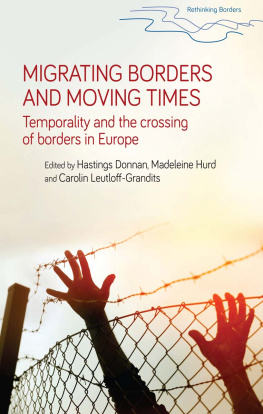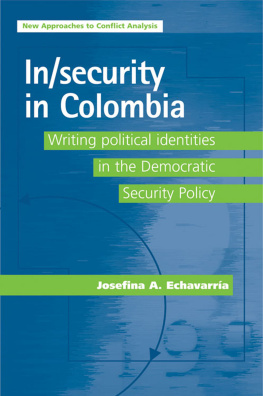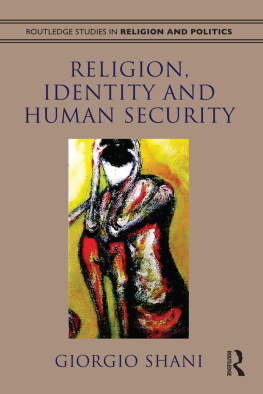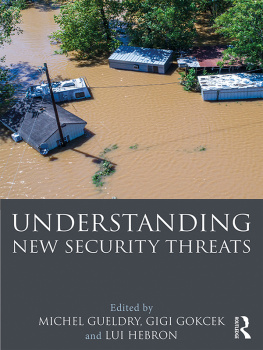BORDERLANDS
Ethnographic Approaches to Security,
Power, and Identity
Edited by
Hastings Donnan and Thomas M. Wilson

Copyright 2010 by
University Press of America, Inc.
4501 Forbes Boulevard
Suite 200
Lanham, Maryland 20706
UPA Acquisitions Department (301) 459-3366
Estover Road
Plymouth PL6 7PY
United Kingdom
All rights reserved
Printed in the United States of America
British Library Cataloging in Publication Information Available
Library of Congress Control Number: 2010924577
ISBN: 978-0-7618-5123-3 (paperback : alk. paper)
elSBN: 978-0-7618-5124-0
 The paper used in this publication meets the minimum
The paper used in this publication meets the minimum
requirements of American National Standard for Information
SciencesPermanence of Paper for Printed Library Materials,
ANSI Z39.48-1992
Contents
Hastings Donnan and Thomas M. Wilson |
Josiah McC. Heyman |
Carmen Alicia Ferrads |
Melissa Gauthier |
Hastings Donnan and Thomas M. Wilson |
Matthew H. Amster |
Ioannis Manos |
Hilary Cunningham |
Acknowledgments
We thank our contributors for their patience, responsiveness and overall good humor in the course of crafting this book. We are also grateful to our editors at University Press of America, Patti Belcher and Brooke Bascietto, who initiated this project and steadfastly shepherded us along. This project also benefited greatly from the hard work and editorial diligence of Teodora C. Hasegan and Sarah Hayman, of the Department of Anthropology of Binghamton University. Without their support this book would still be forthcoming, and we are very grateful for their dedication. Finally we would also like to note that this book, as in all of our jointly authored and edited publications, is a shared project, and that both of us should be considered as principal authors regardless of the order of names on the cover.
Hastings Donnan and Thomas M. Wilson
Belfast and Binghamton, 1 December 2009
Contributors
Matthew H. Amster is an Associate Professor in the Department of Anthropology at Gettysburg College. His research in Borneo has focused on processes of sociocultural change among the Kelabit, including religious conversion, urban migration, and the effects of living along the international border. He has also done research on Civil War reenactors, and is currently working on a documentary film project about Gettysburg, Pennsylvania.
Hilary Cunningham is Associate Professor of Anthropology at the University of Toronto. Her areas of research include international borders, land ethics, human territoriality and environmental politics. In her most recent publications, she has explored the linkages between border security and urban landscapes, as well as the ways in which border regimes interface with wildlife conservation corridors.
Hastings Donnan is Professor of Social Anthropology at Queens University Belfast. He is the author, editor or co-editor of over fifteen books including, most recently, The Anthropology of Ireland (with Thomas M. Wilson, Berg, 2006), Culture and Power at the Edges of the State (with Thomas M. Wilson, Lit Verlag, 2005), Interpreting Islam (Sage, 2002), and Borders: Frontiers of Identity, Nation and State (with Thomas M. Wilson, Berg, 2001). He is currently working on the role of trauma and atrocity in identity narratives of frontier Protestants along the Irish border.
Carmen Alicia Ferrads is an Associate Professor at the Department of Anthropology, Binghamton University. Before coming to the United States, she was a professor at the National University of Misiones, Argentina. Her recent research has been on environmental struggles in the Triple Frontier of the Southern Cone and transformations of the social state in Argentina. Her publications focus on critiques of development, border studies and environmental and social justice movements.
Mlissa Gauthier is a cultural anthropologist and is currently a Postdoctoral Research Associate at Binghamton University, State University of New York, teaching classes in economic anthropology. She wrote her dissertation in anthropology at Concordia University, Montreal, on the used clothing cross-border trade between the US and Mexico.
Josiah McC. Heyman is Professor of Anthropology and Chair of the Department of Sociology and Anthropology at the University of Texas at El Paso. He is the author or editor of three books and over fifty articles, book chapters, and essays on borders, state bureaucracies, migration, power, and anthropological theory. His current work focuses on mobilities and enclosures in society, including a special edited issue (with Hilary Cunningham) of Identities (Vol. 11, No. 3) and (with Robert Pallitto) Theorizing Cross-Border Mobility: Surveillance, Security and Identity, Surveillance & Society Vol. 5.
Ioannis Manos is Lecturer in Social Anthropology of the Balkans in the Department of Balkan Studies at the University of Western Macedonia, Florina, Greece. He holds an MA (1998) and PhD (2002) in Social/Cultural Anthropology from the University of Hamburg in Germany. He has conducted fieldwork in northern Greece on the politics of culture and identity and on forms of cross-border movement and cooperation between Greece and neighboring countries.
Thomas M. Wilson is Professor of Anthropology and Chair of the Department of Anthropology at Binghamton University, State University of New York. He has done ethnographic research in Irish, British, Hungarian and Canadian borderlands. His most recent books are The Anthropology of Ireland (with Hastings Donnan, Berg, 2006), Drinking Cultures (editor, Berg, 2005), and Food, Drink and Identity in Europe (editor, Rodopi, 2006). He is the co-editor of the journal Identities: Global Studies in Culture and Power.
1 Ethnography, security and the frontier effect in borderlands
Hastings Donnan and Thomas M. Wilson
When in the early 1990s we first turned our direct attention to international borders as sites for our ethnographic research and as arenas for comparative and theoretical investigation, much had occurred in world affairs to warrant new and continued anthropological and other scholarly interest in borders. The end of the Cold War, the creation of dozens of new national states and their new international borders, and the expansion of the European Union (at the time to twelve, then fifteen and now twenty-seven member states) were but a few of the globally significant developments in the changing nature of states, their internal and external borders, and their changing relations to territory, sovereignty and citizenship within a globalizing world terrain. It was clear to the both of us at the time that while borders had always been significant political and economic entities, for many reasons related to international commerce, statecraft, sovereignty and security, there were forces at work that were calling into question these roles. Also called into question were the ways we understood borders, within and across the many scholarly disciplines interested in chronicling and theorizing the movement and stasis of people, goods, ideas, and capital. Put differently, we realized then and are as convinced as ever that international and interstate borders should be attractive to all scholars interested in the politics and economics of the contemporary and past human condition.
Next page








 The paper used in this publication meets the minimum
The paper used in this publication meets the minimum